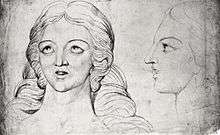Corinna

Corinna (Ancient Greek: Κοριννα Korinna) was an ancient Greek lyric poet from Tanagra in Boeotia. Although ancient testimonia say that she was a contemporary of Pindar, modern scholars are divided on the accuracy of this tradition, and some claim that she is more likely to be from the Hellenistic period. Though her poetry is of interest as one of the few preserved female poets from ancient Greece, it is generally regarded poorly by modern critics.
Life
According to ancient tradition, Corinna lived during the 5th century BC.[1] She was supposed to have been a contemporary of Pindar, either having taught him,[lower-alpha 1] or been a fellow-pupil of Myrtis with Pindar.[lower-alpha 2][2] She was said to have competed with Pindar, defeating him in at least one competition, though some sources claim five.[lower-alpha 3][2] She was from Tanagra in Boeotia.[3]
However, from the early twentieth century, scholars have been divided over the accuracy of the traditional chronology of Corinna's life.[4] As early as 1930, Edgar Lobel argued that the language used in Corinna's surviving poetry seems to favour a later date than tradition suggests,[5] and that there is no reason to believe that Corinna significantly predated the mid-fourth century BC, the point at which the orthography preserved in the Berlin Papyrus of Corinna's poetry began to be used.[6] More recently, M. L. West has argued for dating Corinna to the late-third century BC, and W. J. Henderson supports a middle-ground, between West's very late and the traditional early date.[4] Other scholars such as Archibald Allen and Jiri Frel argue for the accuracy of the traditional date,[7] writing that a Hellenistic Corinna as argued for by West would be "astonishing".[8]
Poetry
Corinna, like Pindar, wrote choral lyric poetry – as demonstrated by her invocation of Terpsichore, the Muse of dance and chorus, in one of her fragments.[9] According to Derek Collins "the most distinctive feature of Corinna's poetry is her mythological innovation",[10] and one ancient story says that Corinna considered that myth was the proper subject for poetry, and rebuked Pindar for not paying sufficient attention to it.[lower-alpha 4][11] Corinna's poetry concentrates on local legends,[12] and she makes use of the Boeotian dialect, possibly to convey her local pride and patriotism.[10]
Marylin Skinner argues that Corinna's poetry is part of the tradition of "women's poetry" in ancient Greece, though it differs significantly from Sappho's conception of that genre.[13] She suggests that Corinna's songs were composed for performance by a chorus of young girls in religious festivals, and were related to the ancient genre of partheneia.[14] Skinner considers that although it was written by a woman, Corinna's poetry tells stories from a patriarchal perspective,[13] describing women's lives from a masculine perspective.[15]
Reception
In the early Roman Empire, Corinna's poetry was popular. However, modern critics have tended to dismiss it, considering it naive and shallow. Though her poetry is not well-regarded by critics, Corinna's work has been of interest to feminist literary historians, as one of the few extant examples of ancient Greek women's poetry.[16]
Notes
References
- ↑ West 1990, p. 553
- 1 2 Allen & Frel 1972, p. 26
- ↑ Skinner 1983, p. 9
- 1 2 Collins 2006, p. 19
- ↑ Lobel 1930, p. 364
- ↑ Lobel 1930, pp. 356, 365
- ↑ Collins 2006, p. 19, n. 6
- ↑ Allen & Frel 1972, p. 28
- ↑ Skinner 1983, p. 11
- 1 2 Collins 2006, p. 21
- ↑ Collins 2006, p. 26
- ↑ West 1990, p. 555
- 1 2 Skinner 1983, p. 10
- ↑ Skinner 1983, p. 11
- ↑ Skinner 1983, p. 15
- ↑ Skinner 1983, p. 9
Works cited
- Allen, Archibald; Frel, Jiri (1972). "A Date for Corinna". The Classical Journal. 68 (1).
- Collins, Derek (2006). "Corinna and Mythological Innovation". The Classical Quarterly. 56 (1).
- Lobel, Edgar (1930). "Corinna". Hermes. 65 (3).
- Skinner, Marylin B. (1983). "Corinna of Tanagra and her Audience". Tulsa Studies in Women's Literature. 2 (1).
- West, Martin L. (1990). "Dating Corinna". The Classical Quarterly. 40 (2).
- Guy Vottéro: "Remarques sur les graphies et la langue des papyrus de Corinne", in Brixhe, Claude - Vottéro, Guy :Folia Graeca in honorem Edouard Will. Linguistica, De Boccard, Paris 2012, ISBN 978-2-913667-34-1, S.97–159.